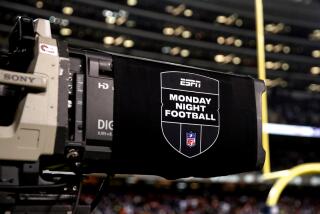PBS SoCal KOCE raises $49 million in FCC spectrum auction
KOCE, the flagship PBS station for Southern California, will see a $49-million windfall from the auction of the public airwaves to companies with wireless networks.
The Federal Communications Commission’s auction raised $19.8 billion from bidders that included T-Mobile, Dish and Comcast, the FCC announced Thursday.
About $10 billion of that amount went to TV station license holders who gave up all or part of their broadcast frequencies that can now be eventually used to service wireless providers. About $7 billion will go to reduce the federal deficit.
A total of 175 stations will sell their spectrum back to the government. Of those stations, 133 will continue to serve their markets by broadcasting on another channel through a sharing arrangement. Thirty other winners successfully moved to other frequencies. About 12 stations will leave the air completely, none of which are in the Los Angeles market.
The auction proceeds were also a boon to San Bernardino public TV station KVCR, which previously announced it’s receiving $157 million from the auction. The station is owned by San Bernardino Community College.
In both cases, the stations are selling their broadcast spectrum while retaining the ability to still serve their viewing audiences that watch them through over-the-air broadcast television. KVCR is moving from its spot on the UHF band to a new frequency. KOCE entered a channel-sharing agreement with Los Angeles station KSCI.
Viewers who watch the over-the-air signal will have to use the re-scan function on their TV sets to get the stations on their new frequencies after the transition occurs over the next few years. Cable and satellite subscribers will not know the difference.
“There will be no impact on the viewer,” said Andrew Russell, president and chief executive of PBS SoCal.
The auction proceeds are meaningful for public broadcasters who are facing significant federal funding cuts proposed by the Trump administration.
Russell said the one-time proceeds will be used to invest in new programming, initiatives in broadband services and establishing an endowment fund to provide ongoing income. But the station will still need the federal stipends it receives every year for its operating costs.
The auction proceeds were “on the low side” of what the station expected to receive, Russell said.
That was the consensus of most of the auction participants as demand for spectrum from wireless carriers was not as robust as expected. Many stations expected much higher revenue from the auction.
Some small, lower-power stations that weren’t eligible to participate in the auction may go off the air, especially if they have to spend millions to move to another channel on the radio-wave spectrum.
Maxwell Agha and his wife, Michelle Diaz Agha, have invested millions into their San Diego station KSDY-TV, which broadcasts Spanish-language news and local programming. They’ve asked the FCC to change the station’s status so that it would be eligible to receive funds from the auction.
“It’s up to them to grant us relief, otherwise there is no guarantee we’re going to survive this,” Maxwell Agha said.
Twitter: @SteveBattaglio
More to Read
Inside the business of entertainment
The Wide Shot brings you news, analysis and insights on everything from streaming wars to production — and what it all means for the future.
You may occasionally receive promotional content from the Los Angeles Times.







